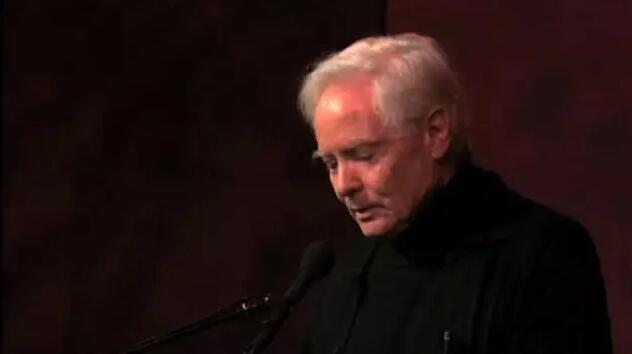《英語(yǔ)錯(cuò)不起》欄目收錄了人們?cè)谌粘I钪腥菀子缅e(cuò)的英語(yǔ)口語(yǔ)表達(dá),是糾正易錯(cuò)英語(yǔ)表達(dá),學(xué)習(xí)正確的交際英語(yǔ)口語(yǔ)的好幫手。通過(guò)學(xué)習(xí)本欄目,英語(yǔ)學(xué)習(xí)愛(ài)好者可以掌握地道的英語(yǔ)口語(yǔ)表達(dá),是提高英語(yǔ)口語(yǔ)水平的極好的英語(yǔ)欄目。
本期話(huà)題:爸,我有幾句話(huà)跟你說(shuō)
《昨日(Yesterday)》獻(xiàn)給父親的詩(shī)
作 者:【美】W.S. Merwin(默溫)
譯 者:麥格蘭島
朗讀者:作者本人
Yesterday
W. S. Merwin
My friend says I was not a good son
一個(gè)朋友說(shuō)我不是個(gè)好兒子
you understand
你明白的
I say yes I understand
我說(shuō)是的我明白
he says I did not go
他說(shuō)我并沒(méi)有經(jīng)常去
to see my parents very often you know
看看我的父母你知道的
and I say yes I know
我說(shuō)是的我知道

even when I was living in the same city he says
即使當(dāng)我跟他們同住在一個(gè)城市時(shí)他說(shuō)
maybe I would go there once
也許我一個(gè)月
a month or maybe even less
甚至更長(zhǎng)時(shí)間才去看他們一次
I say oh yes
我說(shuō)嗯是的
he says the last time I went to see my father
他說(shuō)上次我去見(jiàn)我父親
I say the last time I saw my father
我說(shuō)上次我見(jiàn)到我父親
he says the last time I saw my father
他說(shuō)上次我見(jiàn)到我父親
he was asking me about my life
他一邊問(wèn)我過(guò)得怎么樣
how I was making out and he
問(wèn)我?jiàn)^斗得怎么樣他一邊
went into the next room
走進(jìn)隔壁房間
to get something to give me
去拿點(diǎn)什么東西送給我
oh I say
嗯我說(shuō)
feeling again the cold
又一次感覺(jué)到我父親手上的
of my father's hand the last time
寒冷,最后一次
he says and my father turned
他說(shuō),我父親
in the doorway and saw me
轉(zhuǎn)向門(mén)口,他看見(jiàn)我
look at my wristwatch and he
在看手表,于是他
said you know I would like you to stay
說(shuō)你知道的,我很希望你能多待一會(huì)
and talk with me
跟我聊聊
oh yes I say
嗯是的我說(shuō)
but if you are busy he said
不過(guò)要是你忙他說(shuō)
I don't want you to feel that you
我不希望你覺(jué)得你
have to
就非得待著
just because I'm here
就因?yàn)槲以谶@兒
I say nothing
我什么都沒(méi)說(shuō)
he says my father
他說(shuō)我父親
said maybe
說(shuō)也許
you have important work you are doing
你有正經(jīng)事情要去做
or maybe you should be seeing
或者你要去見(jiàn)
somebody I don't want to keep you
什么人我不想留著你
I look out the window
我望向窗外
my friend is older than I am
這個(gè)朋友比我年長(zhǎng)
he says and I told my father it was so
他說(shuō),于是我告訴我父親確實(shí)如此
and I got up and left him then
然后我就起身丟下了他
you know
你知道
though there was nowhere I had to go
只是我并沒(méi)有什么地方要去
and nothing I had to do
并沒(méi)有什么事要做
作者及朗讀者介紹
W·S·默溫(W.S.Merwin,1927—),美國(guó)著名詩(shī)人,“新超現(xiàn)實(shí)主義”詩(shī)歌流派的代表人物。他曾憑借《移動(dòng)的靶子(The Moving Target)》和《扛梯子的人(The Carrier of Ladders)》分別獲得業(yè)內(nèi)最高獎(jiǎng)項(xiàng)“全美圖書(shū)獎(jiǎng)(National Book Award for Poetry)”和“普利策獎(jiǎng)(Pulitzer Prize for Poetry)”。他于1971年和2009年兩度獲得“普利策獎(jiǎng)”。2010年起,默溫被美國(guó)國(guó)會(huì)圖書(shū)館(Library of Congress)任命為第17任“美國(guó)桂冠詩(shī)人(United States Poet Laureate)”。

他的詩(shī)作貌似松散、甚至神秘,他善于用閃忽的、蜻蜓點(diǎn)水的語(yǔ)言將自然和日常經(jīng)驗(yàn)上升到一個(gè)更高的、撲朔迷離的境界中去。
默溫自1976年起定居夏威夷,專(zhuān)心研究禪宗,種了700余棵珍稀的棕櫚樹(shù)。他一般每年出門(mén)兩三次,參加些朗讀活動(dòng),平時(shí)只是坐在家里看太平洋。“我沒(méi)有電子郵件,我也不想要這東西。而且我不喜歡跟別人講話(huà),我想過(guò)那種非常安靜的生活。”他說(shuō)。











